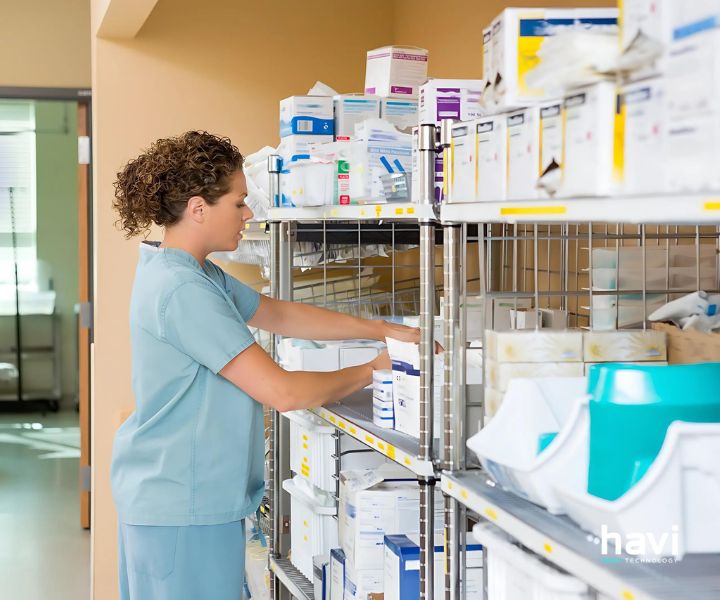Want to see how Havi can help with your ERP software implementation?
Let our dedicated team support you every step of the way.
Thank you for messaging us
You message has been sent.
We will get back to you shortly.
You might also like
Optimising supply chain, fleet, and warehouse management is key to thriving in the logistics world. ...
Pharma ERP software streamlines operations for companies by integrating processes like production, i...
Rising healthcare costs require healthcare providers to reassess their business strategies. The boar...





As healthcare organisations grow, having a strong healthcare ERP system is more crucial than ever. It enables you to manage various aspects of business operations, from patient care to financial management, and administrative tasks into one unified platform.
In this post, let’s explore the top 5 ERP software for the healthcare industry, must-have features, and actionable steps for selecting the right solution for your healthcare business.
What is Healthcare ERP Software?
Healthcare ERP software is designed to centralise and manage administrative, financial, and clinical operations in healthcare organisations. It integrates various processes under a single platform, from patient care to supply chain management. As a result, it enhances efficiency, improves care coordination, and ensures regulatory compliance.
In 2023, the global healthcare ERP market was valued at approximately USD 7.42 billion and is projected to expand at a CAGR of 7.2% from 2024 to 2030. This growth reflects the increasing demand for integrated solutions that streamline operations and improve patient outcomes in the healthcare sector.
Common types of healthcare ERP solutions:
Type of healthcare ERP
Description
Pharmaceutical ERP
These ERPs manage the entire supply chain, from production to distribution, while ensuring regulatory compliance.
Some key features:
Hospital ERP
Designed to streamline comprehensive operations, integrating administrative, financial, and clinical workflows.
Key features:
Clinical ERP
ERP systems aimed to centralise patient records, improve clinical workflows, and manage day-to-day operations.
Key features:
Health insurance ERP
Manages policies, and claims, and ensures compliance with healthcare regulations.
Key features:
Healthcare financial ERP
Primarily designed for managing the financial side of healthcare operations, including billing, revenue cycle management, and financial reporting.
Key features:
Telehealth ERP systems
Supports the growing field of telemedicine by integrating virtual consultation platforms, managing patient appointments, and ensuring patient data security.
Key features:
What Are the Key Features of a Healthcare ERP System?
Managing healthcare operations is complex, with challenges such as coordinating patient care, ensuring compliance, and managing finances. To tackle these challenges, healthcare ERP systems offer features that centralise patient data, optimise clinical workflows, and ensure compliant operations. Here are the top 6 key features of ERP solutions for your business.
Appointment scheduling & staff management
Inefficient scheduling often leads to long wait times and staff shortages, frustrating both patients and your organisation. ERP software gives you and your patients the ability to schedule appointments in advance and manage staff resources more effectively. This reduces patient wait times, minimises scheduling conflicts, and ensures that staff are optimally allocated.
Clinical operations management
Managing clinical workflows manually can be time-consuming and prone to errors, affecting patient experience and operational efficiency. With clinical management features, you can automate tasks such as patient flow, and treatment plans. By tracking patient care from admission to discharge, these systems ensure that healthcare protocols are followed, and improve patient care while making clinical operations run more smoothly.
Procurement & inventory control
In healthcare, running out of critical medical supplies or overstocking can disrupt care delivery and waste resources. Procurement and inventory control modules allow you to track inventory in real time, automate procurement processes and optimise stock levels. This prevents shortages and reduces waste, ensuring that essential medical supplies and equipment are always available when needed.
Financial oversight
Financial management features are important for healthcare organisations. It provides tools to handle billing, manage revenue, and create accurate financial reports. With clear financial oversight, you can focus more on patient care and less on administrative burdens.
Compliance & security
This healthcare ERP module is a must-have functionality to meet strict healthcare regulations like HIPAA or GDPR. It helps you ensure compliance with these regulations through secure data encryption, access controls, and audit trails. This not only protects patient data but also makes it easier for you to monitor and maintain compliance.
Data analysis & reporting
Without real-time insights, it’s hard for you to make informed decisions. A healthcare ERP offers robust data analytics and reporting tools, allowing you to track important metrics like patient outcomes and financial performance. These insights support better decision-making, helping to improve patient care and optimise operational efficiency.
Top 5 Proven ERP Solutions for Healthcare Professionals
1. Odoo
Odoo is a highly modular, open-source ERP platform with a wide range of applications tailored for various industries, including healthcare. It’s known for its flexibility, allowing you to customise and integrate only the necessary modules.
Pros:
Cons:
Requires technical expertise for setup and customisation, which may add to initial costs.
2. Microsoft Dynamics 365
As a robust cloud-based ERP and CRM platform, Microsoft Dynamics 365 is highly regarded for its seamless integration across Microsoft’s ecosystem. For healthcare, it provides powerful tools for managing patient information, financials, and operations while maintaining strong data security and compliance features.
Pros:
Cons:
3. Infor
Infor’s CloudSuite for Healthcare is designed to improve operational efficiency and improve patient outcomes by providing healthcare professionals with real-time data and insights.
Pros:
Cons:
4. QAD ERP for Life Sciences & Medical Devices
This cloud-based ERP solution is specifically designed to meet the unique needs of companies in the life sciences sector, including pharmaceuticals, biotechnology, and medical device manufacturing.
Pros:
Cons:
5. Acumatica
Do you want to access real-time data across multiple devices? Acumatica can help you with that! As a cloud-based ERP solution, Acumatica excels at financial management, data security, and system integration.
Pros:
Cons:
5 Steps to Select ERP Software for Healthcare Businesses
Step 1: Identify specific healthcare needs
Different types of healthcare providers - such as hospitals, clinics, pharmaceutical companies, and health insurance providers - have varying requirements. For example:
Step 2: Evaluate ERP industry-specific features
Healthcare ERP systems are not one-size-fits-all, so evaluating industry-specific features is crucial. Look for an ERP solution that supports the following:
Step 3: Consider integration capabilities
Healthcare businesses often rely on multiple systems - such as laboratory systems, EHRs, patient portals, and billing systems - that need to work seamlessly together. When choosing an ERP, it’s essential to ensure that it can integrate smoothly with your existing systems, enabling:
Step 4: Assess vendor capabilities
You should pay attention to these key aspects when evaluating vendors:
Step 5: Work with experts
Before making a final decision, it’s essential to see the ERP system in action. Schedule demos and conduct proof of concept (PoC) tests to evaluate the system’s usability, features, and performance under real-life conditions.
What’s next?
Choosing the right healthcare ERP is essential for improving operations and patient care while maintaining compliance. You should assess your specific requirements, prioritise key features, and partner with a reliable ERP implementation partner to ensure a smooth implementation for better outcomes.
ERP for Healthcare Industry - Frequently Asked Questions (FAQs)
1. What is the difference between ERP and EHR?
ERP is a software system that helps businesses manage back-end operations like finance, supply chain, human resources, and operations while EHR focuses on patient data, billing, medical records, and clinical workflows.
2. What is the best ERP for healthcare?
Here are the top 5 ERP solutions ideal for specific healthcare scenarios:
3. How much does it cost to implement a healthcare ERP solution?
The cost of implementing a healthcare ERP solution varies widely based on the size of the healthcare organisation, the complexity of the system, and whether it’s cloud-based or on-premise.
It’s crucial to work with a trusted implementation expert to avoid costly errors and ensure the system is tailored to your specific needs. Experienced professionals can streamline the process, ensure compliance with healthcare regulations, and help maximise the ROI by offering support during setup and training, ultimately reducing downtime and operational disruptions.
Reference: